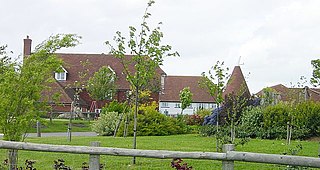Related Research Articles
Palliative care is an interdisciplinary medical caregiving approach aimed at optimizing quality of life and mitigating suffering among people with serious, complex, and often terminal illnesses. Within the published literature, many definitions of palliative care exist. The World Health Organization (WHO) describes palliative care as "an approach that improves the quality of life of patients and their families facing the problems associated with life-threatening illness, through the prevention and relief of suffering by means of early identification and impeccable assessment and treatment of pain and other problems, physical, psychosocial, and spiritual." In the past, palliative care was a disease specific approach, but today the WHO takes a more broad approach, that the principles of palliative care should be applied as early as possible to any chronic and ultimately fatal illness.
Hospice Palliative Care Ontario (HPCO) is an organization whose members provide end-of-life palliative care to terminal patients in the province of Ontario, Canada. It is the result of an April 2011 merger of the Hospice Association of Ontario (HOA) and the Ontario Palliative Care Association (OPCA). It is one of twelve primary care practitioner units participating in the development of advance care planning in Canada led by the Canadian Hospice Palliative Care Association and partly funded by the Canadian Institutes of Health Research.

Royal Trinity Hospice is the oldest hospice in the United Kingdom, founded in 1891 by a member of the Hoare banking family. It is located in Clapham Common, London, England, and provides specialist palliative care. In 2019 Royal Trinity Hospice was rated "Outstanding" by the Care Quality Commission, the highest rating that can be awarded. The hospice provides palliative and end of life care for patients in an inpatient unit at their Clapham Common headquarters and in the community, wherever patients may be living. In 2018 Trinity cared for 2,500 patients and in addition provided pre- and post-bereavement support for over 900 carers.

The Archdiocese of Miami is a particular church of the Catholic Church in the United States of America. Its ecclesiastical territory consists of Broward, Miami-Dade and Monroe counties in the U.S. state of Florida. The archdiocese is the metropolitan see for the Ecclesiastical Province of Miami, which covers Florida. The archbishop is Thomas Wenski. As archbishop, he also serves as pastor of the Cathedral of Saint Mary, the mother church of the archdiocese. Also serving are 258 priests, 133 permanent deacons, 41 religious brothers and 204 religious sisters who are members of various religious institutes. These priests, deacons and persons religious serve a Catholic population in South Florida of 475,774 in 109 parishes and missions.

A children's hospice is a hospice specifically designed to help children and young people who are not expected to reach adulthood with the emotional and physical challenges they face, and also to provide respite care for their families.
Rainbow Hospice and Palliative Care, founded in 1981, is one of the oldest and largest non-profit hospice and palliative care providers in Illinois.

The American Academy of Hospice and Palliative Medicine (AAHPM) is a professional organization for physicians specializing in Hospice and Palliative Medicine, headquartered in Chicago, Illinois. Membership is open to all health care providers committed to improving the care of patients with serious or life-threatening illnesses. AAHPM has more than 5,200 members; 82 percent are physicians, 12 percent are nurses or other health care providers and 6 percent are residents or students.
Community Hospice & Palliative Care, also known simply as Community Hospice, is a not-for-profit hospice, which has served the Greater Jacksonville Metropolitan Area since its inception in 1979. The organization was the first hospice program in Northeast Florida and one of a few operating programs in the state when Florida began granting hospice licenses in 1981; Community Hospice received their license in 1983 and in 2008, assisted nearly 1,000 patients daily and more than 6,000 patients a year.

Trinity Health is an American not-for-profit Catholic health system operating 92 hospitals in 22 states, including 120 continuing care locations encompassing home care, hospice, PACE and senior living facilities. Based in Livonia, Michigan, Trinity Health employs more than 120,000 people including 5,300 physicians. Sponsored by Catholic Health Ministries, Trinity Health operates facilities in the US states of Alabama, California, Connecticut, Delaware, Florida, Georgia, Idaho, Illinois, Indiana, Iowa, Maine, Maryland, Massachusetts, Michigan, Nebraska, New Jersey, New York, North Carolina, Ohio, Oregon, Pennsylvania and South Dakota.

In the United States, hospice care is a type and philosophy of end-of-life care which focuses on the palliation of a terminally ill patient's symptoms. These symptoms can be physical, emotional, spiritual or social in nature. The concept of hospice as a place to treat the incurably ill has been evolving since the 11th century. Hospice care was introduced to the United States in the 1970s in response to the work of Cicely Saunders in the United Kingdom. This part of health care has expanded as people face a variety of issues with terminal illness. In the United States, it is distinguished by extensive use of volunteers and a greater emphasis on the patient's psychological needs in coming to terms with dying.
Hospice care is a type of health care that focuses on the palliation of a terminally ill patient's pain and symptoms and attending to their emotional and spiritual needs at the end of life. Hospice care prioritizes comfort and quality of life by reducing pain and suffering. Hospice care provides an alternative to therapies focused on life-prolonging measures that may be arduous, likely to cause more symptoms, or are not aligned with a person's goals.
OSF HealthCare is a not-for-profit Catholic health care organization that operates a medical group, hospital system, and other health care facilities in Illinois and Michigan. Headquartered in Peoria, Illinois, OSF HealthCare is owned and operated by the Sisters of the Third Order of St. Francis.
Robert Twycross is a retired British physician and writer. He was a pioneer of the hospice movement during the 1970s, when he helped palliative care gain recognition as an accepted field of modern medicine.

Mercy Medical Center is located in Springfield, Massachusetts. Founded by the Sisters of Providence Health System, Mercy Hospital is a faith-based, non-profit organization serving patients regardless of background or beliefs. Mercy Medical Center is known for its tradition of holistic health care.

Penrose Hospital is a 364-bed hospital hospital located in Colorado Springs, Colorado and owned by Penrose-Saint Francis Health Services. The campus includes Penrose Hospital, the Penrose Cancer Center, the E Tower building, the Penrose Pavilion, and John Zay House.

The Medical institution "Children's Hospice" - is a non-profit institution of pediatric palliative care for minors under 18 years. The first children's hospice in Russia.
Carondelet Health Network is a large Catholic health care provider based in Tucson, Arizona. It has five facilities: Carondelet St. Mary's Hospital, Carondelet St. Joseph's Hospital, Carondelet Neurological Institute, Carondelet Heart & Vascular Institute, and Carondelet Holy Cross Hospital in Nogales, Arizona.

Together for Short Lives is the UK registered charity for children's palliative care. Together for Short Lives’ vision is for children and young people in the UK with life-limiting and life-threatening conditions and their families to have as fulfilling lives as possible, and the best care at the end of life.
St. Francis Hospice is an end-of-life care provider in Honolulu, Hawaii. Founded in 1978, it was the first hospice in the state, and is part of the St. Francis Healthcare System of Hawaii. The hospice currently provides end-of-life care for terminally ill patients at home and in its dedicated 12-bed facility at the Sister Maureen Keleher Center in Nuʻuanu.
Sister Maureen Keleher was an American hospital administrator and hospice advocate. She served as chief executive officer of St. Francis Medical Center in Honolulu, Hawaii, from 1953 to 1988. An early advocate of the hospice concept in Hawaii, Sister Keleher established St. Francis Hospice, the first hospice in the state, in 1978. In 1988, St. Francis opened the Sister Maureen Keleher Center, the first freestanding hospice facility in the state, which it named after her.
References
- ↑ Smyser, A. A. (July 29, 1997). "Hospice care could help more in Hawaii". Honolulu Star-Bulletin. Retrieved 2023-01-11– via Newspapers.com.